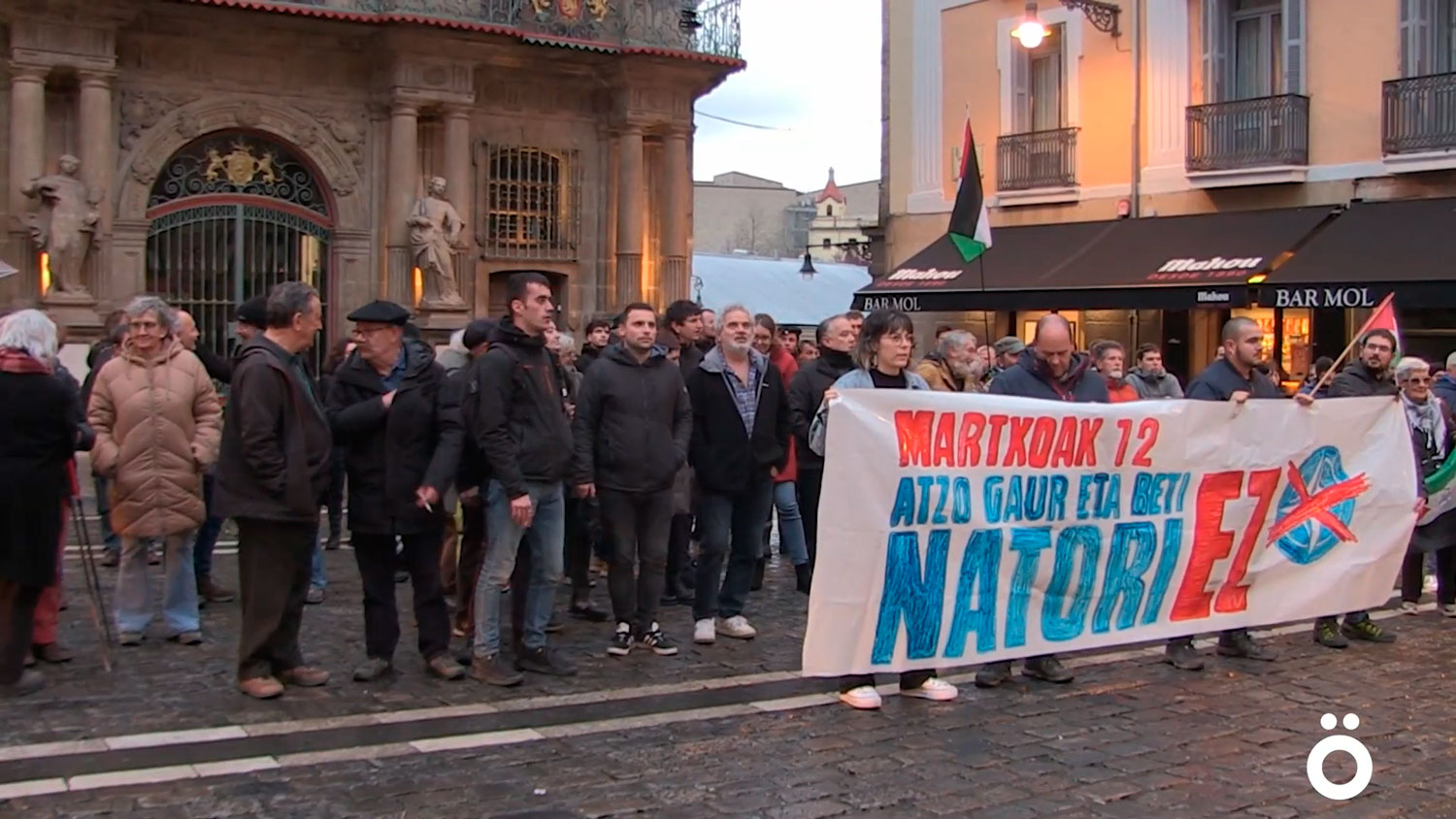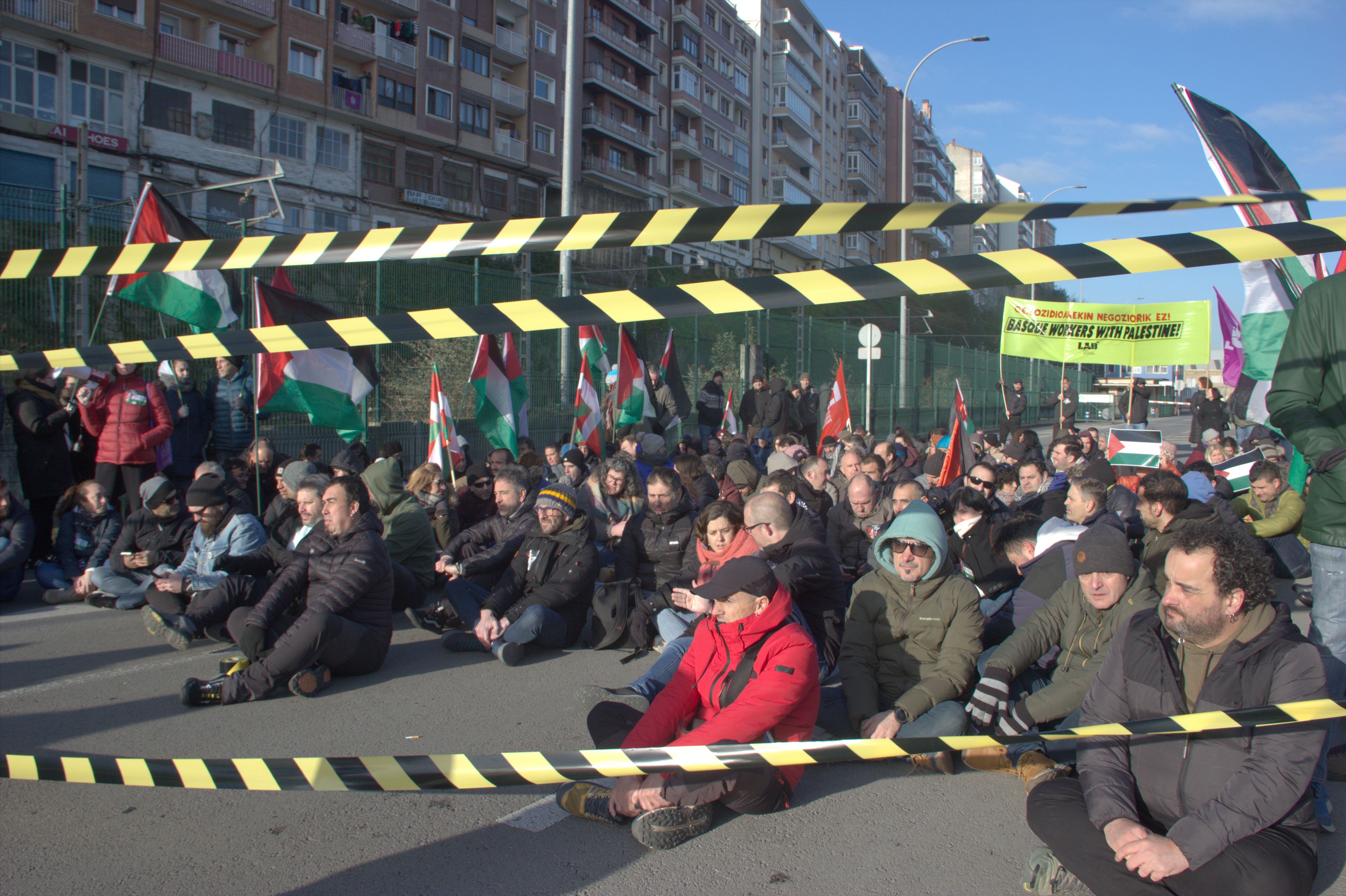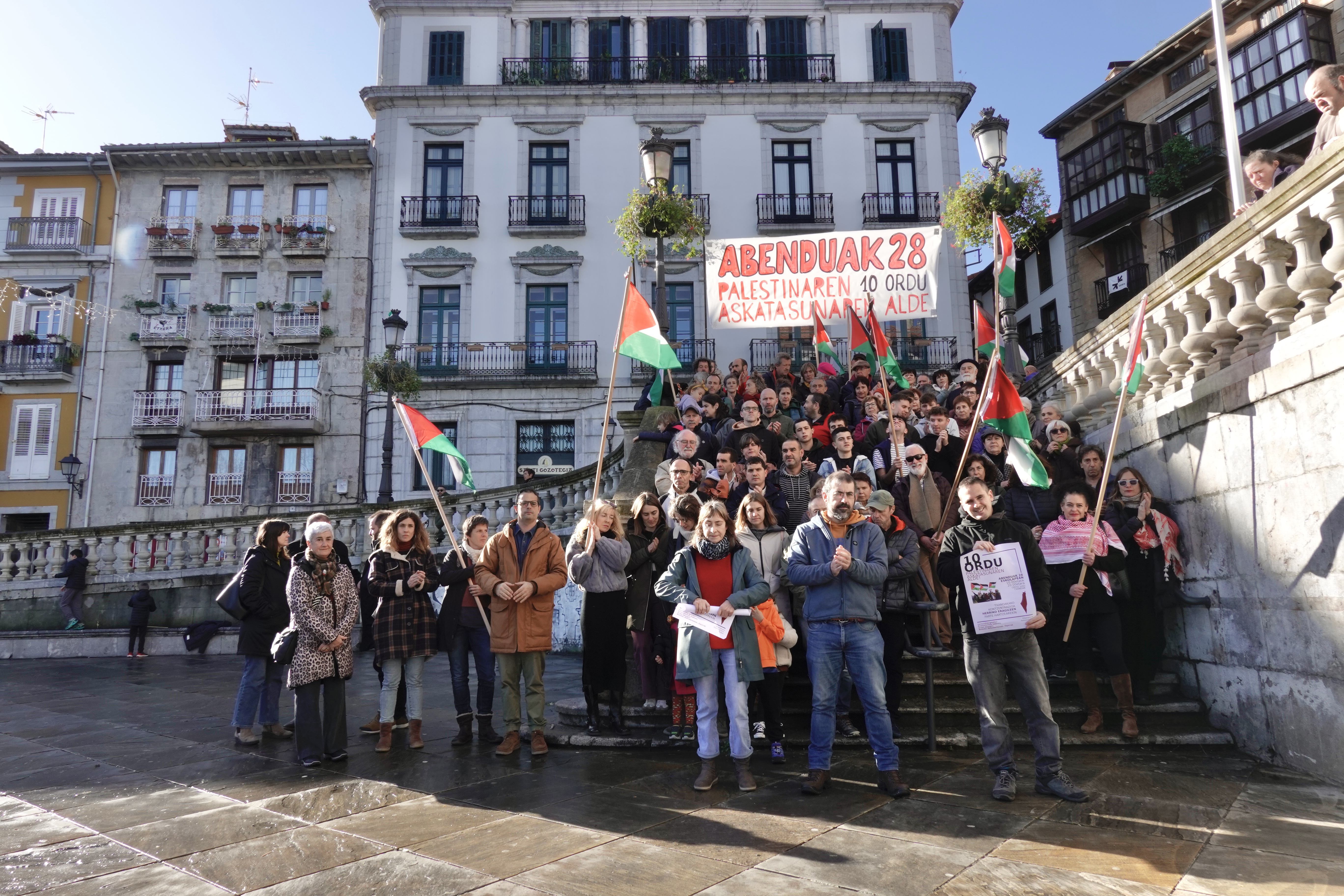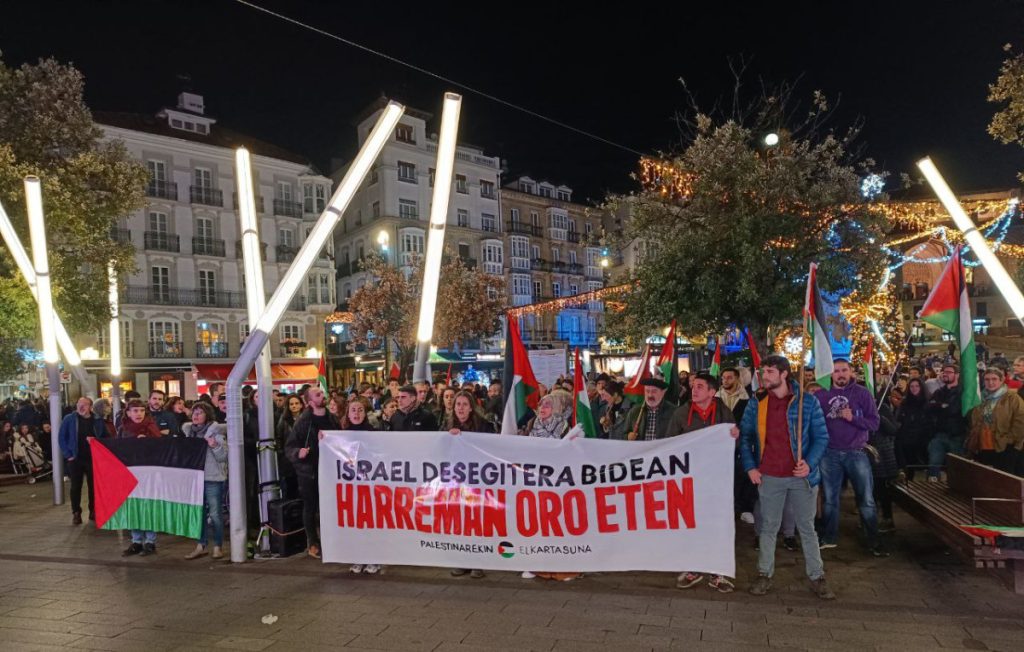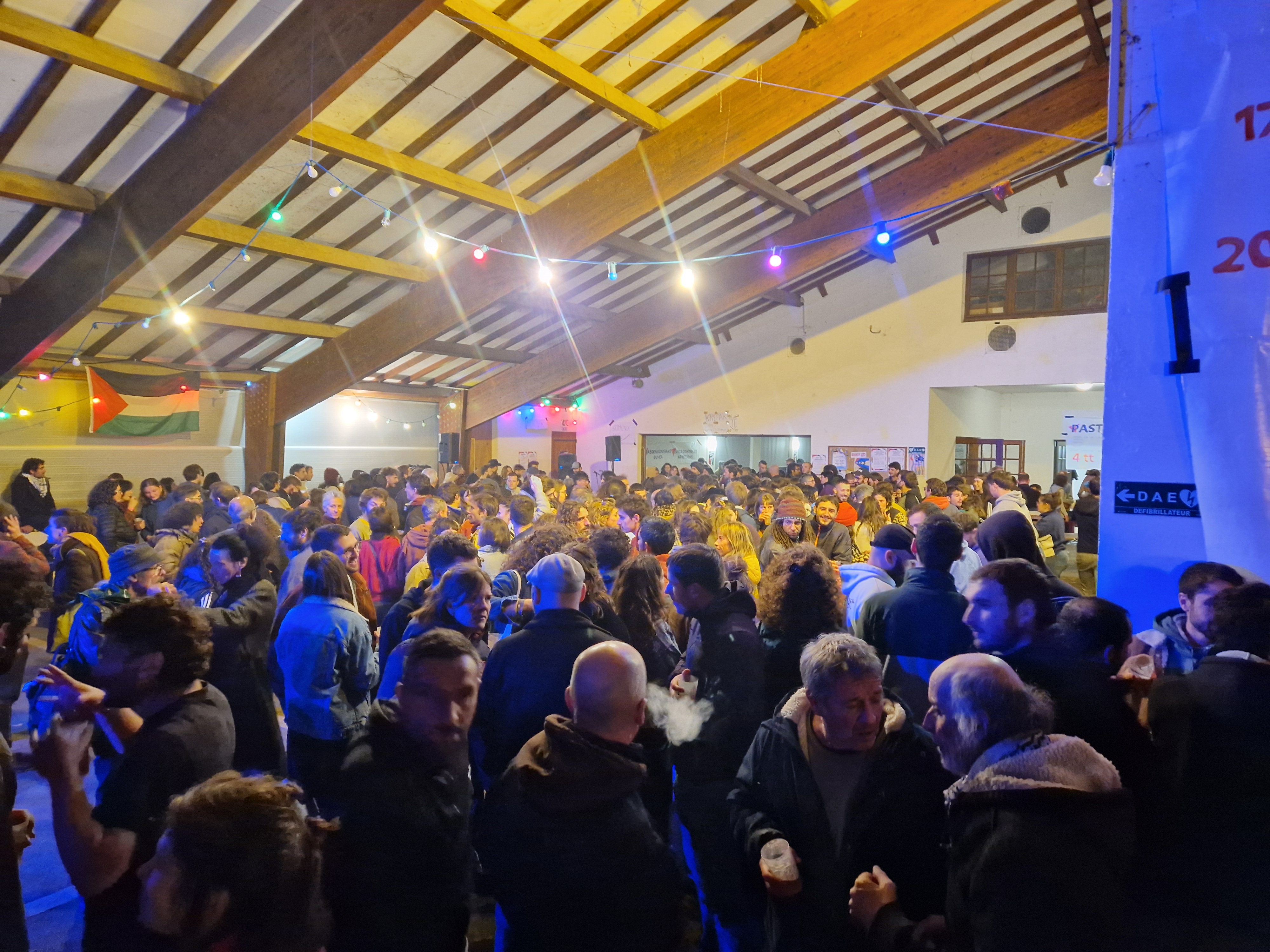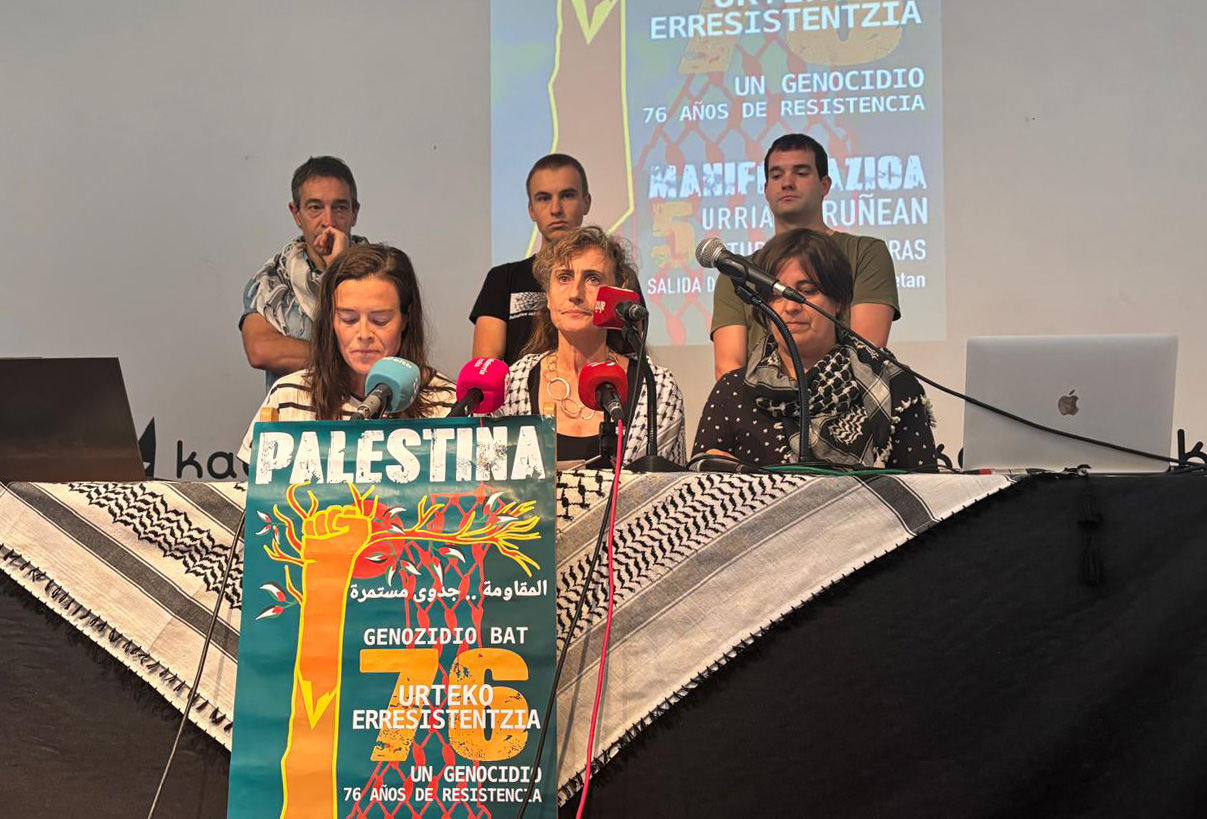"It's a sterile debate, going from the elections or the autonomous way"
- As a child, Raquel Gutiérrez heard songs and stories about various revolutions in Latin America. At just 20 years old, he met the children of those riots in college, and then headed south, with the new outbreaks of liberation struggles to live firsthand. El Salvador, Bolivia; action, prison. Then, reflection: to resume, to undertake better. He was at the Kaxilda libraries of Donostia and Katakrak of Pamplona earlier this month, presenting the books.

Matematikaria, soziologoa, aktibista. 80ko hamarkadan Boliviara joan zen eta Tupac Katari (EGTK) erakundeko kide izan zen. 90eko hamarkadan atxilotu zuten, torturatu, eta bost urte egin zituen espetxean. Ez zuten sekula epaitu. Kartzelatik atera ostean hasi zen unibertsitatean lanean, eta Boliviako mugimendu indigena eta sozialei buruzko doktore-tesia idatzi zuen. Gaur egun, Pueblako Unibertsitate Autonomoan ari da irakasle, Mexikon. Hainbat saiakera-liburu argitaratu ditu.
You've been an activist since you were a young man. How did you start?
The year 1979 was an important year: the Sandinista revolution was imposed, 20 years after the Cuban revolution. This victory marked the path of Latin America, broke and resumed a tradition of struggle that came from the guerrillas. The whole continent began to tremble: in Guatemala, for example, indigenous and community movements were spreading during this time. Therefore, the neighbours were in a hurry and, in addition, Mexico had an open door policy, which allowed refugees from other countries, despite the fact that they were imposed a great deal of internal control. The capital was co-infected with Nicaraguans, Salvadorans, Colombians, and the great national university UNAM, what to say… From there I come.
First you went to El Salvador.
Yes, in this whirlwind of refugees and militants, I began to relate mostly to the Salvadorans and was invited to go to San Salvador. I went in 1983, and they stopped me for the first time. I was very young and I was taken prisoner by the split of one of the most important revolutionary institutions in the country. I had no idea about it, because it was a very vertical organization, and the grassroots militants didn't have any information, I got really angry and I got really scared. Fortunately, I was eventually deported, and I swore to myself that I wouldn't have this thing happen again, that is, if I was stopped again, I would know exactly why.
However, you were not put off the desire to keep fighting. The next year, you went to Bolivia.
That's right, I went to Bolivia in late 1984, with a number of colleagues. For 20 years there had been a succession of military governments there, not a single dictator, but several that were suddenly transformed. However, in 1982, a period of democracy was opened and it was concluded that, at a given moment, this democratic period would end, since in Bolivia there is never much resistance, so we would begin to build an organizational process to be prepared when the coup occurred.
So did the Tupac Katari organization start?
We were all very young, and we started building it in a way that was so fresh, maybe naive, but also otherwise. So we got in touch with the Western Aimara communities, very well and very well structured for a long time. At first, we thought we were recruiting and, of course, it wasn't, but they were interested in our path, they wanted to see what we were going to do, and so a very fruitful connection emerged. Of course, at some point we realized that I was preparing something else.
What kind of fighting did you do?
In the end, we made propaganda; as guerrillas, we weren't that interesting. Of course, we were also a political-military organization, as it was understood at that time, but basically what we did was to present discussion topics, publish texts in Aymara and Ketxua languages, publish books and periodicals…
Anyway, we learned a lot about the ways in which the indigenous tradition is organized. For example, according to the indigenous tradition of Andeta, if an organization or a type of organization grows a lot and can no longer be managed well, tradition suggests dividing it into two, so that the two fragments can be manipulated again.
And they stopped you again, but this time you knew why.
I knew it perfectly well. In fact, in the pre-arrest era, something was already happening to us in other organizations: in the political-military organizations, the apparatus, especially the military apparatus, tends to impose its needs, and that is why this other segment of the organization, more linked to the work of ensuring the material and symbolic reproduction of collective life, is subordinated to it.
However, there was something else I did not understand. It was 1992, an important year too, as the Berlin Wall fell in 1989 and, consequently, the Soviet experience. You could completely disagree with that, but at least it was an example and collapsed like a house of cards. It was curious, and we hardly had any information. In Latin America, they were also cutting their heads to the guerrilla movements, and I started thinking, obsessively, what went wrong.
As a result of this reflection, you wrote your first book: Disorderly! Open history of social struggle.
Yes, as I say, everything fell, and in that period something else emerged, the Zapatista uprising, with other codes, with other speeches. While I was in jail, I had time to read, to think about these things, and then I started to write something that, in a way, questioned some of the mantras of the armed left, the most masculine aspects of the armed left. It took me a hard time to write it down, because many rejected me and I condemned them; then we gradually reconciled ourselves.

Then you published another book: Maze fluttering: Introspection in contemporary femininity. There is direct talk of women's domination.
Well, I'll tell you the truth, I wrote that book to get divorced. My life was quite atypical, I was a student in Mexico for a while, but then I traveled around Latin America as an internationalist militant. For the first time, when I got out of jail, I lived a normal, stable life married to a man in a couple. I didn't like anything. It didn't work, and it wasn't that I didn't like what I'd been with for so many years, no, but that I thought it was terrible to live with that man at the time of the wedding, and that I was asking myself: But what is this?
The Water War was an uprising that took place in 2000 in the city of Cochabamba, Bolivia. There you were.
I left jail in 1997 and worked on several things: teaching, then we started an editorial project called Comuna... Then a very intense uprising and mobilization era arose in the country, more or less parallel to what happened in other places in Latin America. The struggles were much more horizontal, more autonomous, formed by far more heterogeneous subjects… And, in Bolivia, the starting point was the Water War.
Why did this uplift occur?
It relates to the issue of concessions. In the liberal era, concessions of natural resources were granted to private companies for their management and profit; to justify it, they said that the management of the private enterprise was more effective than that of the State, which is not true, but in short, they used that argument. A U.S. company was then granted the concession for water management in and around the city of Cochabamba, and the privatization passion was localizing, the conditions that were imposed were outrageous.
For example?
Among other things, they wanted to install measuring instruments on the wells that people had built on their own and on their own. You have done all the work yourself and you get a gringo that wants to collect a fee, what name? He hasn't given you anything. Of course, technocratic matracas, adorned, were dedicated to probing the aquifer, etc., but people responded: “You have given us nothing, not a quarter of weight, and the water is not of anyone, the water is of everyone.” Privatization clashed with the citizens and the city and its surroundings rose up.

The company left, didn't it?
Yes, we kicked out the Bechtel company and got the municipal company back, but we didn't want mayors to pick the director, because the party system elected the mayor, and it was a disaster, worse than the current one. So we started creating something called social control, and together with the water and neighborhood committees, we created a control structure for the city company.
What was it like?
Despite doing so at a low level, it was a very interesting exercise to see how the relationships between the institution and the autonomous movement are established. We realized how difficult it is. The problem, however, was not that they were effective in the old system, but that they revolutionized it. It was not possible to change the ownership regime of the municipal company and, therefore, it was necessary to comply with the management regime of the municipal companies. For example, if the water committees made a gigantic assembly and decided, collectively and after a lot of work, that a tube should go over here and not over there, because that could not be decided only by the director of the company, I don't know who and I know who had to validate it. The institution is not a car, with a steering wheel, which can be diverted here or there. It is a boat capable of resisting the waves and the tempest, formed by moorings: when you hit one, it is able to cope with the impact, sending some of the load to other moorings. That's why it's so elastic, that's why you hold it, you embed it.
In his last book you work on the situation between the institution and the community movement.
My intention is not to put the debate back on for a long time, because I find it sterile, if we have to go on the way to the elections or on the autonomous path. We must try to understand duality not as a binary relationship, this or the other, but as a horizon, as a relationship that is complemented. Feminism helps us a lot. We have to imagine the motion-state relationship, and not insist that the state is one and the only agent. We don't think Man is one and the only agent, don't we? The same is true.
Despite living in Mexico, he has followed the events of the last decade in Bolivia very closely. What do you think?
As for the situation you mentioned to me in the previous question, we have no answer, but we have to take the problems seriously, and the example of progressive governments in Latin America is a clarifier. In the case of Bolivia, there are two clear stages. The first, between 2006 and 2009, with Evo [Morales] already in government: a very interesting assembly was made for the creation of the Constitution, several things were presented and several things were written in the country’s Constitution, things that a few years before we could not dream of.
What had frustrated that initial hope?
If you take the path of the institution and the state, you must know what it is there for, what to achieve. Society or the autonomous movement must have clear minima in which it cannot give in. For me and for many others, it was an indispensable minimum that the olive owners of the eastern part of the country should slip away, for they were only there because the military governments had given them their lands. That had to be changed! But it didn't change. In order to appease the issue of the parties of the right-wing oligarchy, the fraction had been removed from the Constitution, so the right voted in favour.
Why did he become so desperate?
If, as I understand it, you cross a certain limit, those at the top will continue to insist that it and the next one devour. They will explain to you, of course, their very naive explanations; what happens is that you want to hear them.
“Sarritan etortzen zait gogora Cochabambako Uraren Koordinakundean aipatzen genuen lelo bat: Gobernuaren arazoa Evorena da; boterearen arazoa, ordea, gurea”.
Hainbat eragilek deituta, NATOren aurkako elkarretaratzea egin da Iruñeko Udaletxearen aurrean. Izan ere, gaur, martxoak 12, 39 urte bete dira Hego Euskal Herriak, Espainiar Estatua NATOn sartzeko erreferendumari ezezkoa eman ziola. Askapenako kide batek adierazi du, gaurko... [+]
Karmela espazio autogestionastuan egingo ditu, eta Euskal Herriko zein nazioarteko gonbidatuak egongo dira bertan. "Koiuntura analisi orokorretik abiatu eta Euskal Herriko borroka internazionalistaren gakoetarainoko bidea" egingo dutela adierazi du Askapenak... [+]
A ghost crosses the kitchens: The ghosts of Carlos.
Karlos has not been presented to the Master Chef Celebrity. After analyzing its culinary heritage, it is very clear that it will not overcome the selection of its opponents. In fact, the Academy of Gastronomy and the media... [+]
I have recently had the opportunity to see the latest work by Pierre Carles, a committed documentary author. Under the name of Guérilla des FARC, l'avenir a une histoire (FARC guerrilla, the future has history), proposes a renewed account of the armed conflict that has lasted... [+]
Palestinarekin Elkartasunak "sionistekin harreman oro etetera" deitu du. Kanpaina bat jarri dute abian Euskal Herriak Israelgo estatu terroristaren bizirautea bermatzen duten harreman militar, diplomatiko eta kulturalak seinalatu eta hauen etetea exijitzeko. Pasa den... [+]
Palestina, mediatikoki aurkeztua ez den bezala, aipatu zen joan den larunbatean Makean, mintzaldi, tailer, merkatu eta kontzertuen bidez.
The current situation requires a thorough analysis of what is behind titles, demonstrations, the manipulated dissemination of some facts, the dark concealment of others and the disguised propaganda of analysis in most mainstream media. The situation requires that superficial... [+]











